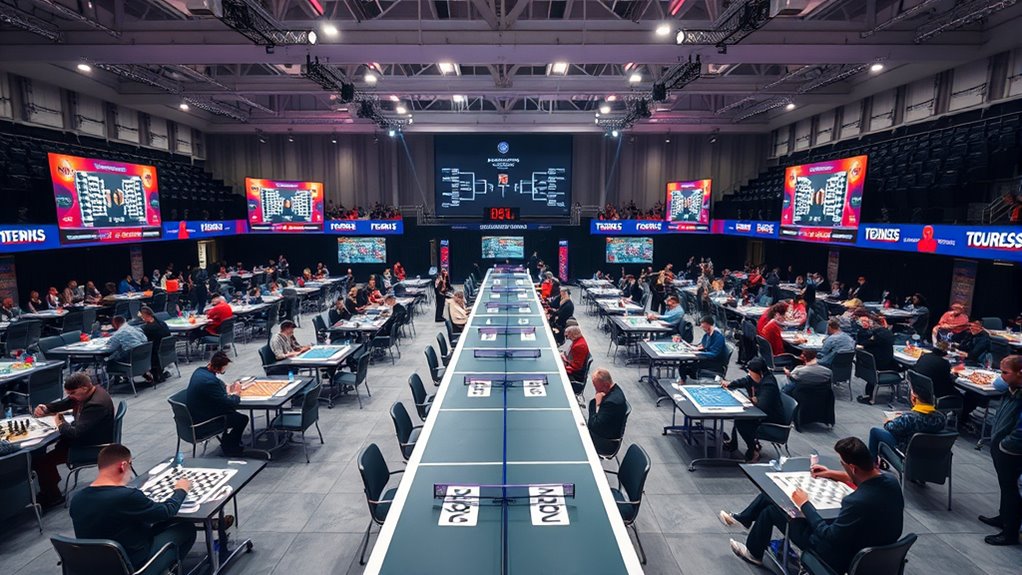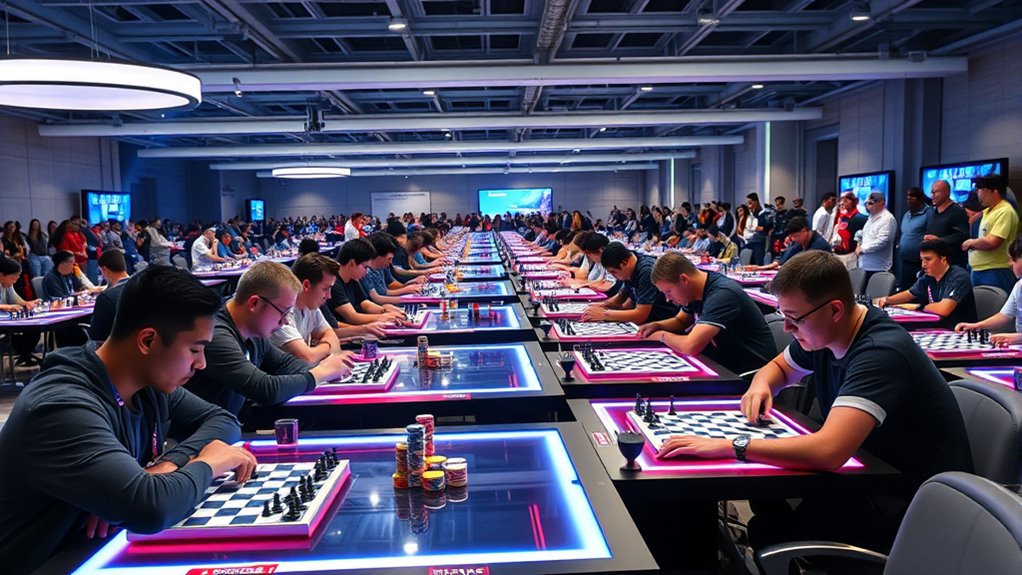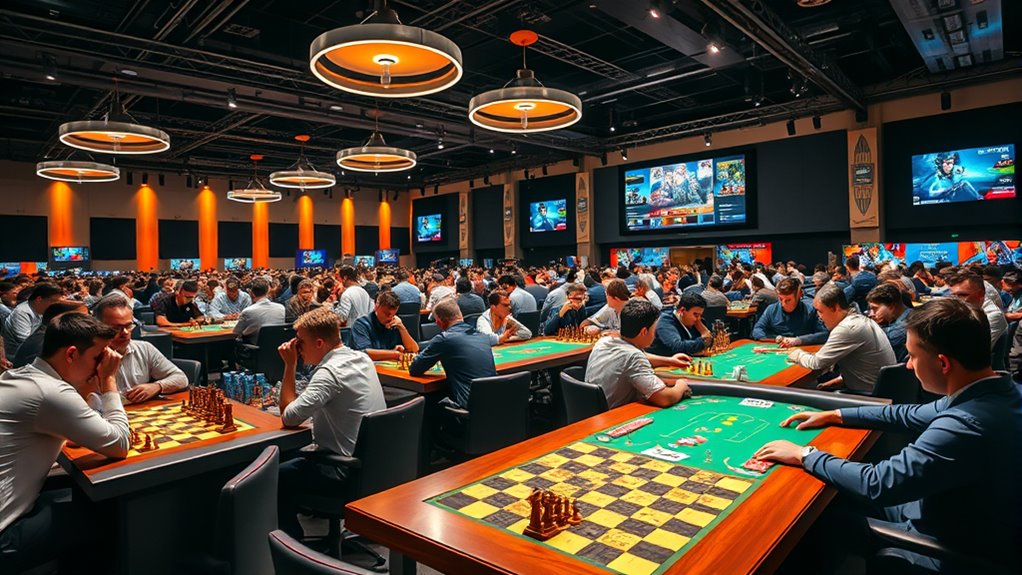In popular table games, you’ll find various tournament formats like knockout, round-robin, and hybrid styles. Knockouts are fast and straightforward, with winners advancing and others eliminated, often using seedings and byes. Round-robin guarantees everyone plays multiple matches, offering fairness and detailed skill assessment. Hybrid formats combine these approaches to balance excitement and fairness. Exploring these structures reveals how organizers create engaging, well-balanced competitions that keep participants and fans hooked.
Key Takeaways
- Popular table games like chess, poker, and backgammon utilize knockout, round-robin, and hybrid formats for organized competition.
- Knockout tournaments are common in poker and backgammon, emphasizing seedings, byes, and tiebreakers for quick elimination.
- Chess tournaments often employ Swiss-system formats to balance fairness and scheduling efficiency across many participants.
- Poker tournaments frequently combine freezeouts, rebuys, and satellite formats, blending formats for increased excitement.
- Some table games adopt innovative and community-focused formats, including online adaptations with AI security and interactive features.
Knockout and Single-Elimination Formats

Knockout and single-elimination formats are popular choices for tournament organizers because they quickly narrow down competitors. You often rely on seedings to rank players or teams, helping to prevent early matchups between top contenders. When the number of participants isn’t a perfect power of two, byes are used to advance some players automatically to later rounds, maintaining the bracket’s integrity. If matches end in a tie, tiebreaker rules come into play, such as additional games, point differentials, or specific criteria, to determine who advances. This format’s straightforward structure makes it efficient, but you should clearly outline seedings, byes, and tiebreaker rules beforehand to guarantee fairness and smooth progression. Proper planning keeps the tournament organized and competitive from start to finish. Additionally, understanding the differences between formats like knockout and other tournament structures can help in selecting the most suitable approach for your event.
Round-Robin and League Systems

Unlike elimination formats, round-robin and league systems guarantee that every participant plays multiple matches against different opponents, providing a thorough assessment of skill levels. This approach allows you to evaluate consistency and adaptability more accurately. However, it introduces several considerations:
- Seeding strategies: Proper seeding helps balance matchups and fairness, especially in large leagues.
- Scheduling challenges: Coordinating numerous matches requires careful planning to avoid conflicts and fatigue.
- Duration: These formats tend to last longer, demanding more time commitment from players.
- Fairness: Every participant faces all others, reducing luck’s impact and increasing fairness.
- Understanding SWIFT/BIC codes can help ensure secure and efficient handling of tournament funds or prizes when necessary.
Hybrid and Modified Tournament Structures

Hybrid and modified tournament structures combine elements of different formats to balance fairness, efficiency, and excitement. These setups often use innovative pairing strategies to match players more effectively, avoiding early mismatches or repetitive matchups. They also incorporate diverse scoring systems, such as point-based or cumulative scores, to better reflect player skill and performance. By blending formats like knockout and round-robin, you can create a dynamic competition that keeps participants engaged and reduces downtime. This flexibility allows organizers to tailor tournaments to specific goals, whether emphasizing fairness or entertainment. Additionally, implementing AI security measures can help monitor and ensure the integrity of online or digital tournaments. Overall, hybrid and modified structures give you the tools to design more balanced and thrilling tournaments, ensuring players stay motivated and spectators stay invested.
Innovative Formats and Their Impact on Play

Innovative tournament formats are reshaping how you experience competition by introducing new structures that challenge traditional play. These formats influence seeding strategies, making initial matchups more strategic and fair. They also enhance spectator engagement by creating more dynamic and unpredictable events, drawing larger audiences. Here’s how they impact you: 1. They promote fairness through adaptive seeding, reducing early mismatches. 2. They encourage diverse gameplay, keeping tournaments exciting. 3. They boost spectator interest with unexpected upsets and storylines. 4. They foster community involvement by supporting live streaming and interactive formats. Additionally, understanding the characteristics of a healthy breakfast can inspire players to maintain optimal energy levels during tournaments.
Frequently Asked Questions
How Do Tournament Formats Influence Player Strategies?
Tournament formats shape how you approach the game, influencing your strategies and decision-making. As formats evolve, you must adapt your playstyle to fit new rules, time limits, or elimination methods. Player adaptation becomes essential, pushing you to refine tactics and stay competitive. Changes in format encourage strategic innovation, ensuring you remain flexible and prepared for different scenarios, ultimately affecting your overall success and enjoyment in competitive play.
What Are Common Challenges in Organizing Large Tournaments?
Organizing large tournaments presents challenges like managing venue logistics and addressing seeding controversies. You need to coordinate space, equipment, and schedules efficiently, or else delays and congestion occur. Seeding controversies can cause disputes and affect fairness, so you must guarantee transparent, accurate seeding processes. Balancing these issues demands meticulous planning, clear communication, and flexibility to adapt, ensuring a smooth, fair experience for players and spectators alike.
How Do Tournament Formats Affect Fairness and Competitiveness?
Your tournament format can make or break fairness and competitiveness—it’s like the backbone of the entire event. By choosing effective seeding methods, you guarantee top players don’t face off too early, maintaining excitement. Proper prize distribution motivates players to perform their best and stay engaged. When formats are well-designed, they create an even playing field, making the competition thrilling and fair, no matter the skill levels involved.
What Role Does Technology Play in Modern Tournament Structures?
Technology plays a vital role in modern tournament structures by enhancing fairness and engagement. You benefit from digital scoring systems that guarantee accurate, instant updates, reducing disputes. Live broadcasting allows you to watch matches in real-time, increasing transparency and excitement. These innovations streamline organization, improve spectator experience, and foster a more competitive environment, making tournaments more accessible and dynamic for players and fans alike.
How Do Cultural Differences Impact Tournament Format Preferences?
Imagine the thrill of competing, but did you know that your cultural norms and regional traditions shape how tournaments are designed? You might prefer intense knockout rounds, while someone else values collaborative formats. These differences create surprises and variety around the world. Your background influences what feels fair or exciting, making each tournament unique. So, next time you play, consider how cultural diversity adds depth to every game you enjoy.
Conclusion
No matter which tournament format you encounter, each offers a unique way to enjoy the game and challenge yourself. Embracing different structures can add variety and excitement to your experience, allowing you to discover new strategies and friendships along the way. So, don’t worry if one style feels unfamiliar — every format is simply an opportunity to grow and have fun. Keep an open mind, and let the game surprise you with its endless possibilities.









